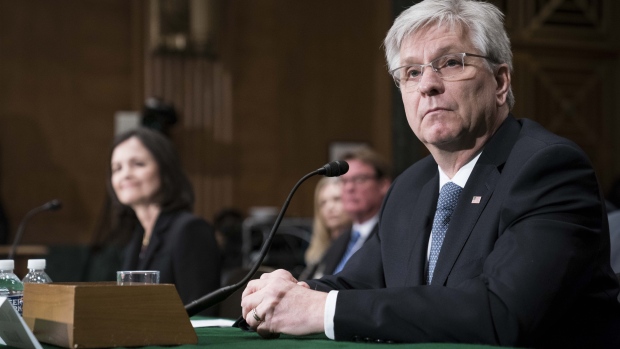Dec 3, 2020
Fed Adds a Dove Who Won’t Veer Because of Biden
, Bloomberg News

(Bloomberg Opinion) -- Almost three decades ago, Christopher Waller published a paper that analyzed how central bankers were appointed in a two-party political system. He concluded that “the party in power will appoint partisans early on but later appointments will be increasingly moderate in their views concerning monetary policy.”
Little did he know he’d wind up being a moderate pick for the Federal Reserve some 28 years later.
The U.S. Senate on Thursday confirmed Waller to the Fed’s board of governors, the fourth and likely the last of President Donald Trump’s appointments to the central bank. Waller, the research director at the St. Louis Fed, would have hardly been considered a moderate pick just a few years ago, given he and St. Louis Fed President James Bullard had persistently taken a more dovish stance than the Federal Open Market Committee as a whole. In their minds, policy is in such a place that higher interest rates simply aren’t needed.
But the central bank’s recent recalibration of its longer-run goals and monetary policy strategy, along with enhanced forward guidance that pledges to leave interest rates near zero until the economy reaches maximum employment and there’s actual evidence of inflation averaging 2% over time, suddenly puts Waller closer to the consensus view. “We don’t buy into the Phillips curve story that low unemployment causes inflation,” he said in a June 2019 interview with Bloomberg Radio’s Kathleen Hays.
It doesn’t hurt that he’s also much more qualified and much less partisan than Trump’s other pending nominee, Judy Shelton. She supposedly favors ultra-low interest rates but was also an ardent supporter of a return to the gold standard, which has virtually no backing within the economist community and which the Bloomberg Editorial board succinctly called “a discussion best left in the dustbin of history.” That kind of about-face is a not-so-subtle hint that her monetary policy views could be influenced just as much by politics as economics.
And let’s not forget others whom Trump has nominated to the Fed only to fall short of the needed votes in the Senate. There was former Republican presidential candidate Herman Cain, who has since died. There was Stephen Moore, an economist at the conservative Heritage Foundation who advised Trump’s 2016 campaign, whom even Senator Lindsey Graham of South Carolina, one of the president’s staunchest allies, called a “very problematic nomination.” Both of these picks raised alarms about the politicization of the world’s most powerful central bank.
As Bloomberg News’s Steve Matthews and Craig Torres noted soon after Waller’s nomination, he raises no such concerns. In fact, many of his most widely cited articles deal specifically with the politics of central-bank independence, something he has called a “key tool” to prevent the government from using monetary policy for short-term gain. So unlike Shelton, he won’t abruptly change course under President-elect Joe Biden’s administration. (That still didn’t stop Democrats from widely opposing his confirmation: He only made it through the Senate on a 48-47 vote.)
In some good news for yield-starved bond investors, Waller is dovish only to a point. He has strongly opposed the negative interest rate policy employed by the European Central Bank and Bank of Japan. That tripped up the late Marvin Goodfriend, another Trump nominee who faltered in part because he viewed negative rates as a potential option. Once again, this puts Waller squarely among the consensus of the Fed board and regional presidents.
The Fed has reacted forcefully to the economic fallout from the coronavirus pandemic, and, as I’ve written recently, the prospect of a divided government next year might put even more weight on the central bank’s shoulders. Waller will have no hesitation about helping to carry the load.
This column does not necessarily reflect the opinion of the editorial board or Bloomberg LP and its owners.
Brian Chappatta is a Bloomberg Opinion columnist covering debt markets. He previously covered bonds for Bloomberg News. He is also a CFA charterholder.
©2020 Bloomberg L.P.






